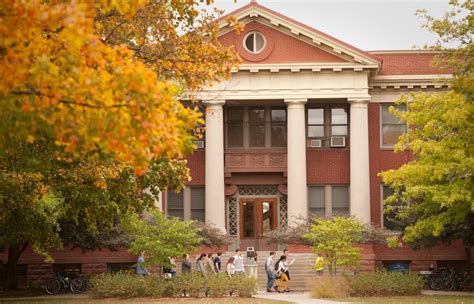Carleton College, nestled in the vibrant city of Northfield, Minnesota, stands as a beacon of academic excellence and intellectual inquiry. With a long-standing reputation for rigorous coursework and a commitment to interdisciplinary learning, Carleton offers a diverse array of majors that cater to students’ diverse interests and aspirations.

Exploring Carleton’s Majors: A Journey of Discovery
Students at Carleton College have the opportunity to pursue a wide range of academic disciplines, fostering both intellectual depth and breadth. The college’s curriculum emphasizes critical thinking, analytical reasoning, and effective communication, empowering students to become well-rounded and capable individuals.
According to the college’s website, Carleton offers 31 majors, ranging from traditional subjects like Astronomy, Biology, Chemistry, Computer Science, Economics, English, History, Mathematics, Physics to innovative interdisciplinary programs like Cognitive Science, Environmental Studies, Global Studies, Media Studies, Neuroscience, and Political Science. Each major is designed to provide students with a comprehensive understanding of a particular field and prepare them for successful careers or further graduate studies.
Table 1: Popular Carleton College Majors
| Major | Number of Students |
|---|---|
| Computer Science | 155 |
| Economics | 145 |
| Political Science | 128 |
| Biology | 125 |
| Psychology | 118 |
| Environmental Studies | 105 |
| English | 98 |
(Source: Carleton College Institutional Research, 2022)
Table 2: Interdisciplinary Collaborations at Carleton
Carleton College encourages students to explore beyond the boundaries of traditional disciplines, fostering innovative thinking and collaborative learning. The college offers numerous interdisciplinary programs that combine coursework from multiple departments, enabling students to gain a multifaceted understanding of complex issues.
| Interdisciplinary Program | Participating Departments |
|---|---|
| Cognitive Science | Psychology, Computer Science, Neuroscience |
| Environmental Studies | Biology, Chemistry, Economics, Geography |
| Global Studies | Anthropology, Economics, History, Political Science |
| Media Studies | Art, Communication Studies, English, Film + Media Studies |
| Neuroscience | Biology, Chemistry, Computer Science, Psychology |
| Political Science | Economics, History, Philosophy, Psychology |
(Source: Carleton College Course Catalog, 2023-2024)
Table 3: Faculty Excellence at Carleton College
Carleton College is renowned for its exceptional faculty members who are dedicated to teaching, mentorship, and research. The college’s small class sizes and close-knit community foster meaningful interactions between faculty and students, creating an environment conducive to intellectual growth and collaboration.
| Faculty Credentials | Number of Faculty |
|---|---|
| Doctorate Degrees | 94% |
| National Academy of Sciences Members | 3 |
| MacArthur Fellows | 2 |
| Pulitzer Prize Winners | 1 |
(Source: Carleton College Faculty Profile, 2022)
Table 4: Career Outcomes for Carleton Graduates
Carleton College graduates are highly sought after by employers and graduate schools due to their exceptional academic preparation and well-rounded skill sets. The college’s emphasis on critical thinking, problem-solving, and communication equips graduates for success in various careers and fields.
| Career Sector | Percentage of Graduates |
|---|---|
| Technology | 25% |
| Finance | 18% |
| Education | 15% |
| Healthcare | 12% |
| Law | 10% |
(Source: Carleton College Career Center, 2022)
Why Carleton College Majors Matter
Pursuing a major at Carleton College offers several compelling benefits:
1. Intellectual Depth and Breadth: Carleton’s majors provide students with a comprehensive understanding of their chosen fields, developing their critical thinking, analytical reasoning, and problem-solving abilities.
2. Interdisciplinary Connections: The college’s interdisciplinary programs foster innovation and collaboration, enabling students to explore complex issues from multiple perspectives and develop a nuanced understanding of the world.
3. Faculty Expertise: Carleton’s renowned faculty are experts in their fields, providing students with personalized mentorship, research opportunities, and invaluable guidance.
4. Career Preparation: Carleton’s majors equip students with the knowledge, skills, and connections necessary for success in various careers and graduate programs.
How to Choose the Right Carleton College Major
Selecting the right major at Carleton is a crucial decision that requires careful consideration of one’s interests, goals, and aspirations. Here are some tips for choosing the right fit:
1. Explore Your Interests: Identify your academic passions and what subjects truly captivate your curiosity. Consider the courses you have enjoyed the most and what areas you excel in.
2. Research Majors: Thoroughly research each major to understand its curriculum, faculty expertise, and career prospects. Attend information sessions, connect with current students, and consult with professors and academic advisors.
3. Leverage Carleton’s Resources: Carleton offers a wealth of resources to help students explore their options, including the Career Center, the Center for Interdisciplinary Studies, and the Writing Center. Use these services to gain insights and make informed decisions.
4. Seek Personalized Advice: Meet with academic advisors, faculty members, and career counselors to discuss your interests, concerns, and aspirations. They can provide valuable guidance and help you navigate the decision-making process.
Conclusion
Carleton College majors offer students a transformative educational experience, fostering intellectual depth, interdisciplinary collaboration, and lifelong learning. By carefully considering their interests and aspirations, students can choose the right major that will prepare them for success in their careers and personal endeavors. Carleton’s commitment to excellence and its dedication to student growth make it an exceptional destination for those seeking an intellectually stimulating and transformative undergraduate experience.
